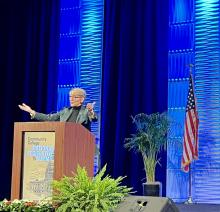
U.S. Energy Secretary Jennifer Granholm kicked off a record-setting Community College National Legislative Summit Monday with an answer to what’s next: clean energy and the workforce training needed to support the $23 trillion sector.
“We’re at this inflection point because we have an opportunity to not only make significant inroads in addressing the climate crisis, but in doing so to really rebuild the economy and… give students entry into the middle class and above,” the former Michigan governor told the record number of more than 1,300 NLS attendees. “You all have got the keys to this future.”
Granholm urged community college leaders to install clean energy on their campuses and work with industry on creating workforce training programs for the more than 400 factories that are opening or expanding throughout the country as a result of the clean energy provisions in the Bipartisan Infrastructure Law. Granholm also urged the more than 120 student trustees and advocates attending the NLS to consider careers in the fast-growing sector: “Stake your claim, shoot your shot, and join the hundreds of thousands of Americans working in clean energy today.”
While much of the focus of the NLS involves working with federal officials, National Governors Association Executive Director Bill McBride began the day by stressing the importance of state-level advocacy and collaboration, particularly given governors’ bipartisan support for the federal CHIPS and infrastructure laws and their role in implementing them at the state level.
“Governors have long understood that education is the key to opportunity and economic advancement,” McBride said during a Monday keynote address. “What’s become more clear is how essential community colleges offer skill-based education that can transform communities and states.”
McBride pointed to governors’ efforts to eliminate the “paper ceiling” of four-year degree requirements in state jobs and initiatives to address workforce needs through registered apprenticeship programs, digital literacy training, and business-education collaborations in high-demand fields such as electric vehicle manufacturing and healthcare.
“There are programs out there that put workers in six-figure jobs after training programs as short as 12 weeks, and they all started with the state leader and job creators and education at the table working together to design curriculum, connect job seekers with employers, and update policies around factors like degree requirements and certification regulations.” he said.
Community college leaders also were briefed on the results of the 2023-24 Digital Learning Pulse Survey, on which ACCT partnered with Cengage, and the next phase of the Kids on Campus Initiative, a growing partnership between ACCT and the National Head Start Association.
Also Monday, community college advocates heard political insights from Amy Walter, editor of The Cook Political Report, and were briefed on legislative priorities by ACCT and American Association of Community College (AACC) public policy leaders. Given the dynamics of the election year and a Congress with historically low numbers of bills passed into law, policy experts focused on places where bipartisan work has continued, including an ongoing push for short-term workforce Pell Grants and reauthorization of the Workforce Innovation and Opportunity Act (WIOA).
Speakers noted that the record number of NLS attendees represent a powerful boost for advocacy efforts. “When community college advocates show up on Capitol Hill in numbers like today, it really says something about our collective vision and mission,” said ACCT President and CEO Jee Hang Lee. “It also says something to the members of Congress and their staffs.”
The NLS continues today with keynote addresses by Assistant Secretary of Commerce Alejandra Y. Castillo and Acting Labor Secretary Julie A. Su and a Congressional Forum on Capitol Hill featuring a bipartisan roster of lawmakers.
Follow the tag #NLS2024 on X and LinkedIn for live updates.